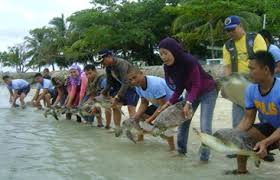WASHINGTON, D.C. — “Fishing is not only an industry in the Philippines. Fishing for Filipinos is a way of life,” a development specialist told USAID officials, diplomats, academics, experts and NGO representatives at a forum held on 6 October 6 at the Wilson Center here.
Together with Nygiel Armada, Tetra Tech chief of party of ECOFISH, Rebecca R. Guieb, USAID development specialist reported on a successful Philippine effort towards sustainable fisheries.
The Ecosystems Improved for Sustainable Fisheries Project (ECOFISH) is a USAID initiative to improve the management of important coastal and marine resources and associated ecosystems in eight marine key biodiversity areas.
It is aimed at reversing fish decline and increasing the number of people with new or better employment from sustainable fisheries by 10 percent and creating strategic public-private partnerships.
“It is our banner marine program in the Philippines and important for inclusive growth,” said Dr. Gloria Steele, USAID senior deputy assistant administrator, in her remarks.
ECOFISH works with the national government and local authorities to understand the status of their fisheries, prioritize issues and recommendations to establish protection measures and create social enterprises for local economic development.
The project also works with community entrepreneurs, including women, for potential tourism and marketing technology support.
USAID also partnered with the Philippine government and Smart Telecommunications to use the SMS broadcast facility for reporting illegal activities and enhancing maritime law enforcement in a marine key biodiversity area in Sulu Archipelago.
“The Philippines appreciates the assistance of USAID through ECOFISH towards Sustainable Fisheries,” Philippine Ambassador Jose L. Cuisia, Jr. said in a statement. “The utilization, management, development, conservation and protection of fishery resources is a central concern in order to sustainably provide for adequate livelihoods and the food needs of our people.”
Together with Microsoft, the Philippine Department of Science and Technology’s Information and Communications Technology Office (DOST-ICTO), and the Department of Agriculture’s Bureau of Fisheries and Aquatic Resources (BFAR), ECOFISH piloted a new technology that taps unused television broadcast frequencies (“TV White Space”).
The aim is to extend wireless Internet access to remote parts of the country in order to enable a mobile, online system to register fisherfolk in the Danajon Reef in central Philippines. Registration is key towards sustainable fisheries management and it allows fisherfolk to access vital government services.
TV White Space was recognized as a model public-private partnership and won the second P3 Impact Award during the 2015 Concordia Summit in New York. Concordia, the University of Virginia Darden Institute for Business in Society, and the U.S. Department of State’s Office of Global Partnerships created the P3 Impact Award to recognize P3s (public-private partnerships) that are changing our world in innovative and impactful ways.
“Innovative projects like ECOFISH has facilitated the delivery of services to intended beneficiaries and has helped develop appropriate governance mechanisms that can achieve the desired impact,” noted Dr. Josyline Javelosa, agriculture attaché at the Philippine Embassy in Washington, D.C.
Like us on Facebook


